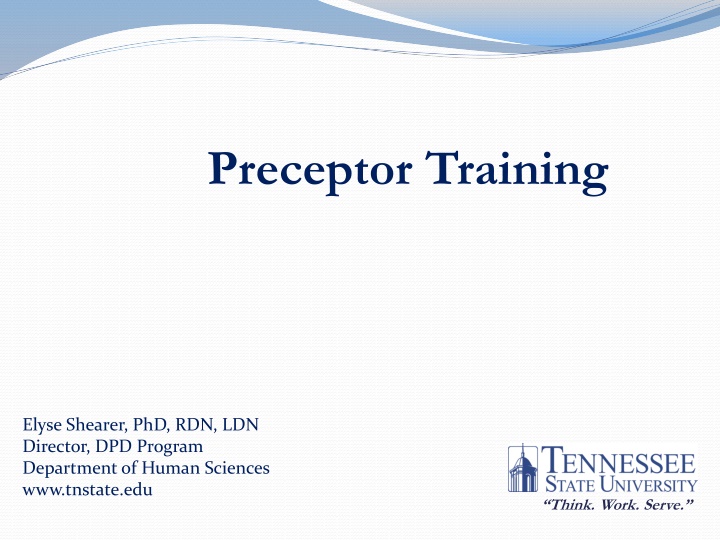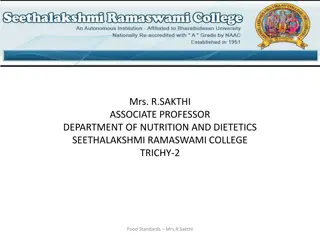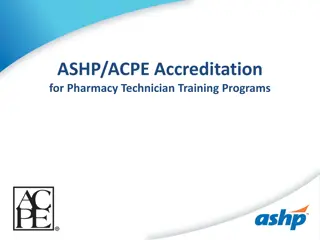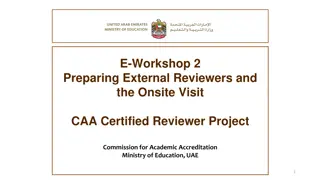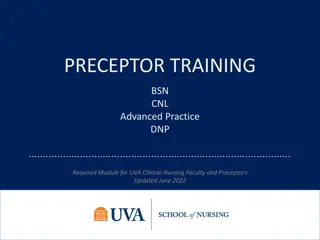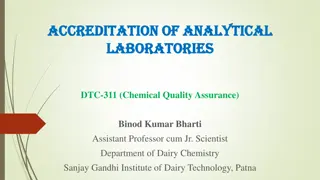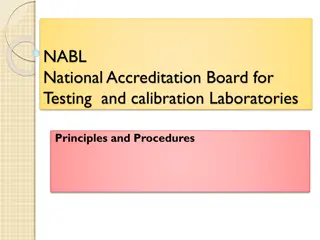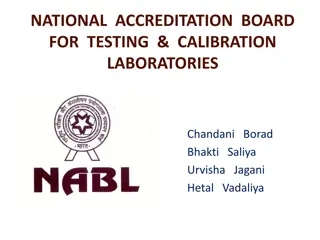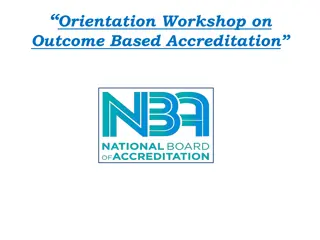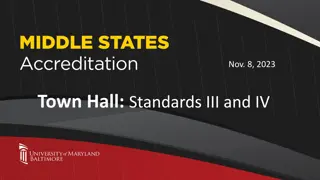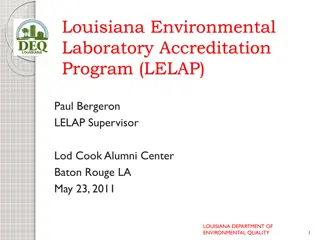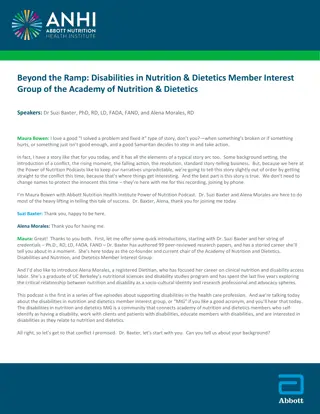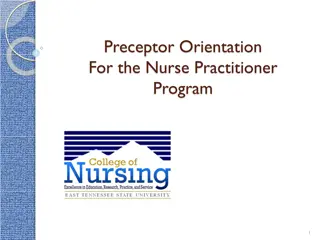Preceptor Training and Accreditation Standards in Dietetics
This content highlights the roles of program directors and preceptors in dietetic education, the significance of ACEND accreditation, and the 2017 standards for dietetics education programs. It emphasizes the importance of hands-on experience and the preparation of students for future careers as registered dietitians. The content also explores the responsibilities of preceptors in guiding students through their field experience and evaluating their progress and performance.
Download Presentation

Please find below an Image/Link to download the presentation.
The content on the website is provided AS IS for your information and personal use only. It may not be sold, licensed, or shared on other websites without obtaining consent from the author.If you encounter any issues during the download, it is possible that the publisher has removed the file from their server.
You are allowed to download the files provided on this website for personal or commercial use, subject to the condition that they are used lawfully. All files are the property of their respective owners.
The content on the website is provided AS IS for your information and personal use only. It may not be sold, licensed, or shared on other websites without obtaining consent from the author.
E N D
Presentation Transcript
Preceptor Training Elyse Shearer, PhD, RDN, LDN Director, DPD Program Department of Human Sciences www.tnstate.edu Think. Work. Serve.
Thank You to Preceptors Thank you for agreeing to serve as a preceptor to the Food and Nutritional Sciences students at TSU! TSU s DPD program is accredited by ACEND to prepare students to complete a dietetic internship and become registered dietitians. While experiential learning is not required for DPD students, the hands-on experience in dietetics students gain from their Field Experience is invaluable to their preparation as future RDNs.
Role of Program Director Delegates data collection to preceptors Compiles and analyzes student outcome data Coordinates submission of all ACEND reports Ensures preceptors are appropriate for subject area Ensure preceptors are trained on program procedures and ACEND standards
Role of Preceptors Broaden the student s insights to the profession of dietetics and gain knowledge in the field of dietetics. Help the student complete food and nutrition-related activities relevant to the facility. Keep student informed of their progress and performance level. Evaluate student at at the completion of the field experience Make suggestions and/or recommendations for improvement as needed.
ACEND Accreditation Council for Education in Nutrition and Dietetics Accrediting agency for education programs preparing student for careers as registered dietitian nutritionists (RDN) and dietetics technicians, registered (DTR) USDE recognizes ACEND as the accrediting body for nutrition and dietetics education programs Functions autonomously from the Academy of Nutrition and Dietetics (AND) and the Commission on Dietetic Registration (CDR) All accreditation decisions are made by a board of directors, comprised of educators, practitioners, student members and public members
2017 ACEND Accreditation Standards Standard and Required Elements: 1: Program Characteristics and Resources 2: Consortia 3: Program Mission, Goals and Objectives 4: Program Evaluation and Improvement 5: Curriculum and Learning Activities 6: Student Learning Outcomes Assessment and Curriculum Improvement 7: Faculty and Preceptors 8: Supervised Practice/Experiential Learning Sites 9: Information to Prospective Students and the Public 10: Policies and Procedures
Standards Define minimum levels of quality Basis for accreditation decisions Applied equally to all programs Revised on a routine basis 2017 Standards implementation: June 1, 2017 Revised 2017 Standards implementation: July 1, 2018
Definitions DPD Didactic program in dietetics Focuses on knowledge (KRDNs) KRDN Knowledge requirement for RDN SLO Student Learning Outcome Preceptor A practitioner who serves as faculty for interns and students during supervised practice by overseeing practical experiences, providing one-on-one training, and modeling professional behaviors and attitudes
Standard 7 Faculty and Preceptors Required Element 7.1: Qualified Faculty and Preceptors Required Element 7.2: Continued Competency and Evaluation Required Element 7.3: Orientation and Training Requirements
Standard 7 Faculty and Preceptors Required Element 7.1: Qualified Faculty and Preceptors The program must provide evidence that qualified and appropriately credentialed faculty and preceptors are sufficient to ensure implementation of the program s curriculum and the achievement of the program objectives and student learning outcomes Faculty and preceptors do not need to be RDNs or NDTRs, if experience and credentialing are appropriate
Standard 7 Faculty and Preceptors Required Element 7.2: Continued Competency and Evaluation Preceptors must: Meet rules for appointment to their positions Have appropriate licensure and/or credentialing for their position and meet any state or federal regulations Show that they have the most recent knowledge in the topic they are teaching. Be reviewed periodically by the program, including input by students and interns
Standard 7 Faculty and Preceptors Required Element 7.2: Continued Competency and Evaluation
Standard 7 Faculty and Preceptors Required Element 7.3: Orientation and Training Requirements Faculty and preceptors must be trained on the: Program s mission, goals, and objectives Program s educational philosophy ACEND standards and curriculum requirements The goal of this training is to ensure continued competence and improvement among all those who participate in teaching students and interns.
Standard 8 Supervised Practice Sites If students are required by the program to complete experiential learning activities at facilities outside the sponsoring institution, the program must have policies and procedures to maintain written agreements with the institutions, organizations and/or agencies providing those experiential learning activities. The policies and procedures must address the selection and periodic evaluation of adequacy and appropriateness of facilities, to ensure that sites are able to provide learning experiences compatible with the learning that students are expected to achieve.
TSU DPD Program Mission The mission of the TSU Didactic Program in Dietetics (DPD) is to support the mission and goals of the University, College and Department by providing a progressive and effective academic curriculum that prepares students to be scientifically competent, accountable, and ethically responsible professionals who are prepared for supervised practice, a health or science-related profession, and/or graduate school, and advancing as self-educating dietetics professionals who are eligible for the CDR credentialing exam to become Registered Dietitian Nutritionists.
TSU DPD Program Goals and Objectives Goal 1: The program will prepare graduates for acceptance and successful completion of a supervised dietetics program and to successfully pass the registration exam. Goal 2: Graduates will have the foundation, knowledge, and skills needed to be competent in a supervised practice, graduate program, and/or dietetics-related employment.
Requirements for Field Experience FACS 4600 Field Experience in Nutrition Requirements 120 hours of experiential learning required Split between 2-3 sites in clinical, community, and food service management Complete at least 20 activities from checklist provided in the syllabus Students should not routinely replace regular employees outside of professional staff experience Please see Preceptor Information Packet provided by the course instructor for more information on requirements of students and preceptors.
CPEUs and Resources for Preceptors CDR Online Dietetics Preceptor Training Course Free of charge 8 CPEUs Preceptors can receive up to 15 CPEUs per 5 year cycle See the CDR PDP Guide for how to log these credits Join NDEP (Nutrition and Dietetic Educators and Preceptors)
